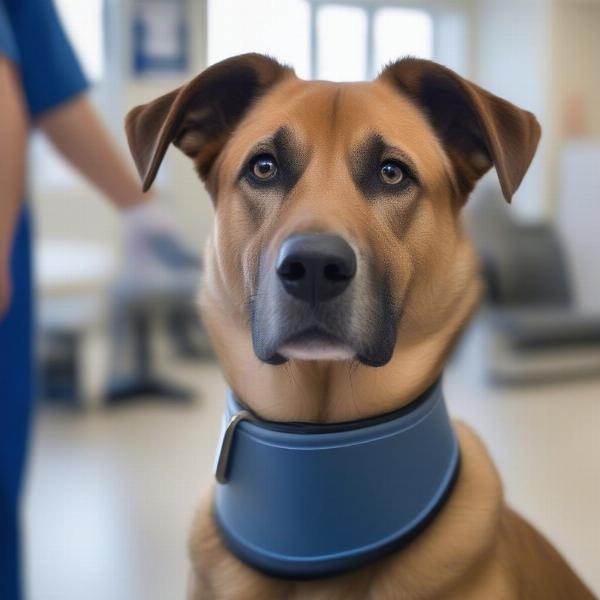A dog vet collar plays a crucial role in your dog’s health and safety, both during routine vet visits and in emergency situations. Choosing the right collar can make a significant difference in your dog’s comfort and wellbeing. This article will explore various aspects of dog vet collars, from understanding their purpose to choosing the right one for your furry friend.
Why a Dog Vet Collar Matters
 Dog wearing a vet collar at the clinic
Dog wearing a vet collar at the clinic
Vet collars, often softer and more comfortable than everyday collars, are specifically designed for use during and after veterinary procedures. They prevent dogs from licking or biting at wounds, sutures, or bandages, promoting faster healing and preventing infections. These collars are typically made of lightweight, breathable materials and come in various sizes to fit all breeds.
Choosing the Right Dog Vet Collar
Choosing the right vet collar depends on your dog’s size, breed, and temperament. Inflatable collars offer good visibility and comfort, while soft cones are less restrictive and allow for more movement. Rigid plastic cones provide maximum protection but can be cumbersome for some dogs. Consider your dog’s individual needs and consult your vet for recommendations.
What to Consider When Selecting a Collar
- Size: Ensure the collar fits snugly but not too tight, allowing two fingers to fit comfortably between the collar and your dog’s neck.
- Material: Choose a soft, breathable material to prevent skin irritation.
- Closure: Opt for secure closures that are easy to fasten and release.
- Visibility: Collars with reflective strips can enhance visibility during nighttime walks.
Dog Vet Collar Alternatives
If your dog struggles with a traditional cone, alternatives like recovery suits or inflatable donuts can provide similar protection with increased comfort and mobility. These alternatives often offer more freedom of movement and prevent dogs from bumping into furniture. harness dog training might be a good alternative for restricting your dog’s movement.
Caring for Your Dog While Wearing a Vet Collar
Using a vet collar can be a new experience for your dog. Providing extra love, attention, and positive reinforcement can help ease the transition. Ensure your dog has access to food and water while wearing the collar and monitor them for any signs of discomfort or distress.
Tips for a Smooth Transition
- Introduce the collar gradually.
- Provide positive reinforcement with treats and praise.
- Supervise your dog while they adjust to the collar.
- Ensure the collar is clean and dry.
When to Consult Your Vet
If your dog exhibits any unusual behavior, excessive scratching, or signs of infection around the wound, consult your vet immediately. They can assess the situation and provide appropriate guidance. You can also discuss options for alternative collars if your dog is experiencing significant discomfort. Remember, your vet is your best resource for ensuring your dog’s health and wellbeing.
Conclusion
A dog vet collar is an essential tool for protecting your dog during recovery. Choosing the right collar and providing proper care can significantly enhance your dog’s comfort and ensure a smooth healing process. By understanding the various options available and consulting your vet, you can provide the best possible care for your furry companion. velvet dog collar can be a good option for everyday use after your dog recovers.
FAQ
- How long should my dog wear a vet collar? This depends on the nature of the injury and your vet’s recommendations.
- Can my dog sleep with a vet collar? Yes, most dogs can sleep comfortably with a properly fitted vet collar.
- How do I clean a dog vet collar? Most collars can be wiped clean with a damp cloth and mild soap.
- My dog keeps trying to take the collar off. What should I do? Consult your vet for advice or consider alternative collar options. fingerprint dog tag is essential for identification in case your dog gets lost.
- What if my dog seems distressed while wearing the collar? Contact your vet immediately for guidance.
- Are there alternatives to the traditional cone-shaped collar? Yes, options like inflatable collars and recovery suits can provide similar protection with increased comfort. Consider a cocker spaniel dogs for sale in scotland if you are looking for a new furry companion.
- Can I take my dog for walks while wearing a vet collar? Yes, short, supervised walks are generally acceptable. last minute uk dog friendly holidays can be a great option for a getaway with your furry friend.
ILM Dog is a leading online resource for dog owners worldwide, offering expert advice on dog breeds, health, training, nutrition, grooming, and much more. We provide comprehensive information to help you make informed decisions about your dog’s care. From breed selection to health concerns, we cover all aspects of dog ownership. Contact us for personalized guidance and support. Email: [email protected], Phone: +44 20-3965-8624. Visit ILM Dog for all your dog-related needs.